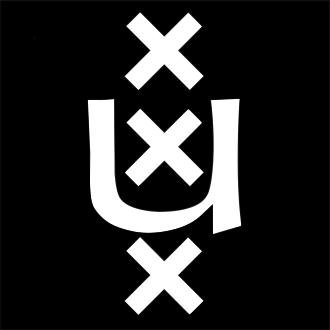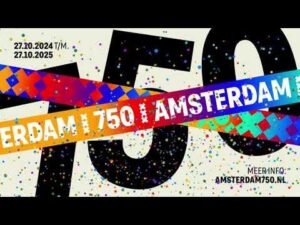Here you can find events organised to further the ATM, such as workshops or open datasprints. We also show other events where the ATM is present.
-
Thu23Apr20269:00 - 18:00Universiteitsbibliotheek Universiteit Utrecht, Locatie Science Park - Boothzaal
Save the date!
In navolging op de succesvolle Landelijke Time Machine-dag in 2024 (georganiseerd door de Amsterdam Time Machine en de Hilversum Time Machine i.o.) zal in 2026 een dag worden georganiseerd door de Utrecht Time Machine.
Houd de socials en deze website in de gaten voor meer informatie over programma en inschrijving.
-
Mon09Mar202613.00 - 18:00UvA, Bushuis, Kloveniersburgwal 48, Amsterdam
More information will follow asap.
-
Thu20Nov202513.00 - 14.00Nieuwe Bibliotheek UvA Universiteitskwartier
De datasprint in het kader van de NDE Maand van het digitaal erfgoed (in het Bushuis van de UvA) zal afgesloten worden met de lancering van de nieuwe landingspagina van de Amsterdam Time Machine. Deze lancering vindt plaats in de centrale hal van de nieuwe universiteitsbibliotheek van de UvA in het Universiteitskwartier).
-
Thu20Nov20259.30 - 14.00Humanities Labs FGW-UvA: Bushuis - Kloveniersburgwal 48 Amsterdam
Inloop: 9.30 uur
Einde: 14.00 uur
Vrije ruimte voor wie wil: 14.00 - 15.30 uur
-
Sat21Jun20259:00 - 18:00Ring A10
Stad van de toekomst - Festival Op de Ring - Universiteit van Amsterdam
De UvA is kennispartner van Amsterdam 750.
De Amsterdam Time Machine staat op de Ring A10 met Homepage van je Huis
-
Wed18Jun202513.00 - 17:00 Humanities Labs FGW-UvA: Bushuis - Kloveniersburgwal 48 Amsterdam
Uitnodiging - Programma en inschrijving
Verhalen van Amsterdam – Datasprint: Bouw mee aan de digitale tijdmachine van Amsterdam
Wat: Amsterdam 750 jaar: de Toekomsttiendaagse Datasprint van de UvA
Waar: Humanities Labs in het Bushuis, Kloverniersburgwal 48, Amsterdam
Datum/tijd: Woensdag 18 juni 2025 van 12.30 – 17.00 uur
Aantal deelnemers: 70 – 75 personen
Deelname: Gratis. Graag aanmelden per e-mail vóór woensdag 11 juni via deze link.De Universiteit van Amsterdam brengt de geschiedenis van de stad tot leven en jij kunt helpen. Tijdens een speciale datasprint koppel je de favoriete plekken van meer dan honderd Amsterdammers aan oude kaarten en archiefstukken. Zo bouw je mee aan de Amsterdam Time Machine.
De afgelopen jaren deelden meer dan honderd Amsterdammers hun favoriete plek in de stad. Prachtige verhalen, van geboren Amsterdammers en van veel migranten. De Universiteit van Amsterdam heeft al deze verhalen verzameld en bouwt nu aan de ‘Amsterdam Time Machine’. Dit is een soort digitale tijdmachine waarmee je door oude straten, buurten en gebouwen kunt "wandelen" en kunt ontdekken hoe mensen vroeger in Amsterdam leefden. Hoe de universiteit dat doet? Met oude kaarten, archiefstukken en moderne technologie zoals 3D-visualisaties en slimme dataverbindingen.
Programma
12.30 Inloop met koffie thee
13.00 Woord van welkom en introductie
* Julia Noordegraaf, projectleider Amsterdam Time Machine
Woord van welkom en introductie Amsterdam Time Machine project
* Laura van Hasselt, universitair docent Publieksgeschiedenis UvA
Over de studentenprojecten van de vakgroep Publieksgeschiedenis UvA
* Simone van Bruggen, machine learning consultant SURF Over het Meaningful Memories project van SURF & ATM
13.30 Klaar voor de start: Pitches van de tafelbegeleiders
13.45 Aan het werk (Deel I)
14.30 Pauze: thee
14.45 Aan het werk (Deel II)
15.30 Plenaire terugkoppeling en samenvatting
16.00 BorrelTijdens de ToekomstTiendaagse organiseert de universiteit een speciale datasprint waar jij de favoriete plekken van Amsterdammers gaat koppelen aan deze oude kaarten, museum- en archiefstukken. Je krijgt eerst uitleg over de tijdmachine. Daarna mag je zelf aan de slag om de verhalen te koppelen aan de locaties in de stad. Het doel van dit project is om de geschiedenis van Amsterdam tot leven te brengen én te bewaren voor de toekomst.
Toelichting op het programma
Tafel 1: tekst, video en AI - met Simone van Bruggen Aan deze tafel gaan we aan de slag met filmpjes die we met een open audiotranscriptiemodel transcriberen en vervolgens annoteren op locatie, personen, organisaties en thema’s. Deze geautomatiseerd gegenereerde annotaties gaan we controleren, waar nodig verbeteren en uitbreiden met informatie uit AdamLink, Wikidata en het NDE Termennetwerk. Zo maken we de inhoud van audio- en tekstbronnen toegankelijk per fragment of passage. Op deze manier brengen we (erfgoed)bronnen over hetzelfde onderwerp samen, en zijn ze makkelijker toegankelijk voor analyse en verder onderzoek. Aan het eind van de dag zijn onze annotaties zichtbaar en toegankelijk via de kaart van Amsterdam.
Materiaal: het corpus van de UvA (Favoriete plek in de stad en Biografie van Amsterdam) – opgebouwd door studenten Publieksgeschiedenis van de UvA, in samenwerking met het Amsterdam Museum.
Tooling: de SURF Meaningful Memories Pipeline (o.a. Whisper (OpenAI), GLiNER)Tafel 2: visueel materiaal: foto’s en beeldcollecties – met Nico Vriend en Leon van Wissen Aan deze tafel gaan we aan de slag met persfoto’s uit vier archieven: het Stadsarchief Amsterdam, het IISG, het Noord-Hollands Archief en het Nationaal Archief. Elke collectie is voorzien van metadata, maar elk op een andere manier. Zo bevat de beeldbank van het Stadsarchief links naar locaties in Amsterdam per foto, maar ontbreken deze in de andere. Andersom, bevat het Stadsarchief juist weer geen classificering op onderwerp, zoals de ANEFO-collectie van het Nationaal Archief. Om eenduidig te kunnen zoeken in alle foto’s uit deze collecties is het wenselijk dat we de beschrijving van de bronnen (de metadata) naar hetzelfde niveau tillen. Net als bij tafel 1 gaan we ook hier aan de slag met automatisch gegenereerde informatie die nog wel gecontroleerd moet worden. We gaan locaties identificeren en thema’s toekennen. De foto’s halen we op uit de Dataruimte Amsterdam. De verrijkingen slaan we, als het even kan, op in de Annotatierepository, een gezamenlijk initiatief van NDE en KNAW-HuC.
Materiaal: fotocollecties van SAA, IISG, NA en NHA - Tooling: Dataruimte Amsterdam, Annotatierepository
Tafel 3: Georefereren van kaarten uit de collectie van Allard Pierson in Allmaps - met Boudewijn Koopmans en Allmaps (T.B.C.) Wil je mee helpen een deel van de 650 gedigitaliseerde Amsterdamse kaarten uit het Allard Pierson te georefereren en zo beschikbaar te maken als IIIF in Allmaps? Dan ben je bij deze tafel aan het goede adres. Georefereren van kaarten wil zeggen dat je oude kaarten digitaal zo goed mogelijk positioneert op een moderne kaart van hetzelfde gebied, aan de hand van en aantal controlepunten. Door oude kaarten te georefereren kun je zien hoe landen, landschappen, en steden veranderen. Dat is heel waardevol voor bijvoorbeeld geografisch, historisch en klimaatonderzoek. Met georefereren maken we de kaarten beter uiteindelijk vindbaar, doordat we uiteindelijk kunnen inzoomen op een bepaalde plek en daar dan in één oogopslag alle relevante kaarten kunnen tonen.
Materiaal: gedigitaliseerde kaarten uit de collectie van Allard Pierson - Tooling: Allmaps, IIIF
Tafel 4: LOD-Train the Trainer-tafel - met Ivo Zandhuis Deze tafel is gereserveerd voor deelnemers aan de LOD-Train the Trainer groep 2025 van de UvA/HvA. Trainees gaan aan de slag met hun eigen datasets en oefenen met het toepassen van Linked Open Data-technieken die tijdens de cursus aan bod zijn gekomen. Geoefende LOD-specialisten uit het Netwerk Digitaal Erfgoed die tijdens deze datasprint ook graag met hun eigen datasets aan de slag willen, kunnen zich - na aanmelding – bij deze tafel aansluiten.
Materiaal: datasets uit diverse instellingen - Tooling: Schema.org, JSON-LD, SPARQL etc.
-> Schrijf je in per e-mail vóór 11 juni in via deze link <-
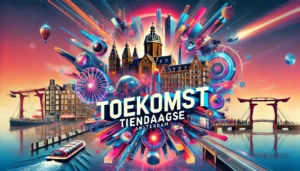 Meer over de ToekomstTiendaagse Op 27 oktober 2025 bestaat de stad Amsterdam 750 jaar. Een jaar eerder, in oktober 2024, is het startsein gegeven voor een jubileumjaar vol activiteiten om de verjaardag van de hoofdstad van Nederland te vieren. Eén van die activiteiten is de ToekomstTiendaagse (van 12 tot 21 juni 2025). Door de hele stad zullen verschillende evenementen worden georganiseerd die in het teken staan van de toekomst. Hoe ziet onze stad eruit in de toekomst? Wat eten we, hoe vervoeren we ons, hoe leven we samen en hoe is de stad ingericht? Hoe zorgen we voor een leefbare stad van de toekomst? Het volledige programma van de ToekomstTiendaagse wordt bekend gemaakt via de website van Amsterdam 750.
Meer over de ToekomstTiendaagse Op 27 oktober 2025 bestaat de stad Amsterdam 750 jaar. Een jaar eerder, in oktober 2024, is het startsein gegeven voor een jubileumjaar vol activiteiten om de verjaardag van de hoofdstad van Nederland te vieren. Eén van die activiteiten is de ToekomstTiendaagse (van 12 tot 21 juni 2025). Door de hele stad zullen verschillende evenementen worden georganiseerd die in het teken staan van de toekomst. Hoe ziet onze stad eruit in de toekomst? Wat eten we, hoe vervoeren we ons, hoe leven we samen en hoe is de stad ingericht? Hoe zorgen we voor een leefbare stad van de toekomst? Het volledige programma van de ToekomstTiendaagse wordt bekend gemaakt via de website van Amsterdam 750.

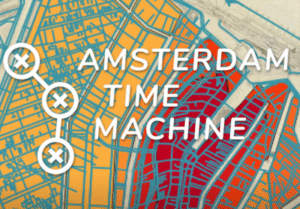
Met medewerking van: Allmaps, Amsterdam Museum, Gemeente Amsterdam, IISG, KNAW-HUC, Netwerk Digitaal Erfgoed, Noord-Hollands Archief, Nationaal Archief, Stadsarchief Amsterdam, SURF en LOD-vrienden. -
Wed04Jun2025Fri06Jun2025VU Amsterdam
Meer info over Digital Humanities Benelux 2025:
DH Benelux 2025 | Centre for Digital Humanities
Op deze conferentie wordt een ATM-pilot gepresenteerd door onze collega's van SURF:
TITLE: Navigating oral history interviews using LLM-based transcription and annotation for the Amsterdam Time Machine
AUTHORS: Simone van Bruggen, Boudewijn Koopmans, Leon van Wissen, Ingeborg Verheul and Annette Langedijk -
Mon02Jun2025Thu05Jun2025Leeds UK
Amsterdam Time Machine en Bibliotheek UvA/Allard Pierson presenteren de Pica Projecten Verbonden Erfgoed.
-
Mon03Mar2025Wed05Mar2025VIenna, Former Länderbank & Museum of Applied Arts
Time Machine Organisation Europe: Innovation through Heritage: resilience in times of climate change
-
Tue14Jan202515.00 - 24.00 uur Paradiso, Amsterdam
Pitch en presentatie Amsterdam Time Machine, door Boudewijn Koopmans & Ingeborg Verheul
-
Tue26Nov2024PAN Amsterdam
TIjdens de PAN beurs, de jaarlijkse kunstbeurs in Amsterdam, biedt het PAN Podium ruimte voor (vak)inhoudelijke discussie. Tijdens het PAN Podium 2024 presenteerden Boudewijn Koopmans (Impact manager UvA) en Epco Runia (Hoofd Collectie en Educatie van Museum Rembrandt Huis) de Amsterdam Time Machine.
De titel van hun presentatie was: Met de Amsterdam Time Machine naar Rembrandts tijd: tijdreizen in Amsterdam.- PAN beurs 2024: Over | PAN Amsterdam
- Meer over het podium: Podium | PAN Amsterdam
-
Thu21Nov202413.00 - 17:30 Haarlemmermeerstation
Wat? Netwerkmiddag Time Machine-initiatieven in Nederland
Wanneer? Donderdag 21.11.024
Waar? Haarlemmermeerstation, Amstelveenseweg 266, 1075 XV, Amsterdam
Welke tijd? 13.00 - 16.00 uur (met aansluitend netwerkborrel)Aanmelden?
De aanmeldingen zijn gesloten. Mocht je toch nog willen komen, stuur dan een mailtje naar amsterdamtimemachine@uva.nl voor een plek op de wachtlijst. Dan laten we het je woensdag aan het einde van de middag weten als er en plek vrijgekomen is.Vervolg op? Landelijke Time Machine-dag 23 maart 2023 in Gouda
Door wie? Amsterdam Time Machine/UvA, Hilversum Time Machine i.o. en Netwerk Digitaal Erfgoed
Voor wie? Iedereen betrokken bij Time Machine-initiatieven in Nederland / iedereen die droomt over zijn/haar/diens eigen Time Machine / en andere partijen die bezig zijn met geschiedenis, kaarten en technologie
Doel? Samenwerking en afstemming bevorderen op het gebied van lokale geo-toepassingen rond historische informatieProgramma:
13.00 Inloop met koffie/thee
13.30 Welkom
13.35 Keynotes
14.50 Gelegenheid tot stellen van vragen
15.00 Korte pauze
15.10 Open podium
15.50 Plenaire afsluiting: Smaakt dit naar meer?
16.00 -17.30 Borrel
Foto-credits van de foto bij dit event op de homepage: Bernardo Lorena Ponte via Unsplash.
-
Tue19Nov2024Lausanne (online)
De Europese Time Machine Organisatie organiseert jaarlijks een summit & general assembly bijeenkomst. In 2024 vond deze summit plaats in Lausanne. ATM project manager Ingeborg Verheul gaf in het kader van de highlights van Local Time Machine Initatives een online presentatie over de Amsterdam Diaries Time Machine - Framework: Local Time Machine Inititiatives.
- Meer over de Time Machine Europe: Time Machine Europe
- Meer over de Summit: TMO Synergy Summit : Time Machine Europe
-
Mon11Nov2024Fri15Nov2024Rijksmuseum Amsterdam
Posterpresentatie ATM over de Amsterdam Diaries Time Machine
Van 11 tot en met 15 november vond het jaarlijkse CIDOC congres plaats in het Rijksmuseum Amsterdam. Ingeborg Verheul van de Amsterdam Time Machine presenteerde er een poster over de Amsterdam Diaries. -
Thu17Oct202412.30 - 16.30 Humanities Labs FGW-UvA: Bushuis - Kloveniersburgwal 48 Amsterdam
- Donderdag 17 oktober 2024:
Annoteren kun je leren! CREATE IIIF/Linked Open Data - Datasprint
Programma en registratie
Op donderdag 17 oktober organiseren UvA's CREATE Lab en de Amsterdam Time Machine, samen met Netwerk Digitaal Erfgoed, Allmaps en het Stadsarchief Amsterdam een datasprint. Doel van deze sprint is om in kleine teams te werken aan annotaties voor verschillende typen bronnen. We gaan aan de slag met kaarten, visueel materiaal en tekstmateriaal (handgeschreven en HTR transcripties). Het thema is: Annoteren kun je leren!
Hieronder meer informatie over het programma
Bijeenkomst: Annoteren kun je leren! CREATE IIIF / Linked Open Data - Datasprint
Datum: Donderdag, 17 oktober 2024
Tijd: 12:30 – 16:30 uur
Locatie: Universiteit van Amsterdam - Bushuis – Kloveniersburgwal 48 – Amsterdam
Taal: NederlandsProgramma
12:30 uur: Inloop - ontvangst met koffie/thee
13.00 uur: Welkom en inleiding
13.30 uur: Kennismakings-intermezzo
13:45 uur: Werken met de data
15:15 uur: Thee/koffie
15.30 uur: Korte presentatie per groep - bespreking vervolg
16.30 uur: Borrel(Foto: Andy Beales @ Unsplash)
-
Thu26Sep2024Koninklijke Bibliotheek Den Haag
De Koninklijke Bibliotheek coördineert de Subsidielijn Verbonden Erfgoed van de Stichting PICA. In dit kader werd in september een netwerkdag georganiseerd. ATM project manager Ingeborg Verheul gaf er een presentatie over het project Toegankelijke Kaartcollectie (juni - november 2024). Dit verkenningsproject is een samenwerking van het CREATE Lab van de UvA en de ATM met de Bibliotheek UvA en Allard Pierson.
Over de subsidielijn: Verbonden digitaal erfgoed | KB, de nationale bibliotheek
-
Wed04Sep2024Sat07Sep2024Ostrava
Presentatie: Mapping Lives - Intersecting Urban History and Life Narratives in Amsterdam door Janna Aerts & Leon van Wissen
Meer over de EAUH: European Association for Urban History | European Association for Urban History | University of Antwerp
-
Thu27Jun2024Beeld & Geluid, Den Haag
Het ministerie van OCW organiseert jaarlijks een kennisfestival voor ambtenaren van OCW en hun kennispartners. Doel van deze dag is de uitwisseling van kennis en het bestendigen van het netwerk.
In de editie van 2024 verzorgde de Amsterdam Time Machine op deze dag een thema-overkoepelende sessie.Over het Kennisfestival
Het OCW Kennisfestival 2024 verbindt wetenschap, praktijk en beleid. Beleidsmakers, onderzoekers en mensen uit het werkveld van OCW komen op het evenement samen om kennis te delen
en van elkaar te leren.Nemen we in de waan van de dag wel genoeg tijd om te leren van het verleden en vooruit te kijken naar wat er in de toekomst op ons af komt? Dit jaar viert het OCW Kennisfestival de kracht van reflecteren en vooruitkijken. Op het evenement brengen we prikkelende lessen uit het verleden samen met de laatste inzichten over de toekomst en laten we zien hoe je deze schatkist aan kennis kunt inzetten voor je werk. Met de kennis van nu kunnen we de complexiteit van vandaag behapbaar maken.Over de sessie
Prof dr. Julia Noordegraaf is hoogleraar Digitaal Erfgoed bij de Faculteit der Geesteswetenschappen aan de Universiteit van Amsterdam en bouwt aan een digitaal platform dat het reizen door ruimte én tijd mogelijk maakt: de Amsterdam Time Machine. Deze tijdmachine brengt het erfgoed op je stoep:
digitaal erfgoed uit musea, archieven en bibliotheken wordt als Linked Open Data met elkaar verbonden en gepresenteerd op kaarten, in 3D modellen en andere vormen die het verleden virtueel toegankelijk maken. Innovatieve toepassingen voor participatie nodigen burgers uit om deze data te verkennen en verrijken met hun eigen perspectief. Dit maakt de Time Machine tot een instrument voor het bouwen aan een inclusieve, leefbare omgeving. Ontdek in deze sessie hoe de Time Machine bijdraagt aan interdisciplinair onderzoek naar complexe vraagstukken als sociale cohesie, inclusieve samenlevingen en ruimtelijke ordening. Denk mee over de relevantie van dat onderzoek en onderliggende data voor beleid ten aanzien van actuele maatschappelijke uitdagingen als klimaat, wonen en emancipatie.Loading...
Julia Noordegraaf gaf een presentatie met de titel: De Time Machine als Macroscoop: Virtueel ruimte- en tijdreizen voor een leefbare wereld. De sessie werd gecompleteerd met een paneldiscussie en een werkopdracht.
-
Thu20Jun2024Universiteitstheater Amsterdam
Presentatie Janna Aerts in Sessie Digital Heritage, over de Amsterdam Time Machine.
Over deze conferentie: amh-at-10-program
-
Fri31May2024Universiteit van Amsterdam
ATM Post-doc Janna Aerts presenteerde de Amsterdam Time Machine en het Amsterdam Diaries Project tijdens een middag van de Huizinga Werkgroep Egodocumenten in Amsterdam, getiteld: Amsterdam Time Machine: een digitaliseringsproject van oorlogsdagboeken door Amsterdamse vrouwen.
Over deze bijeenkomst: Bijeenkomst RNW (Auto)biografie en Egodocumenten - 31 mei 2024, Amsterdam - Huizinga Instituut
-
Tue28May2024Nieuwe Kerk Amsterdam
Het Netwerk Digitaal Erfgoed organiseerde in mei een dag over IIIF voor managers
CREATE/ATM data engineer Leon van Wissen gaf er een presentatie over twee projecten die veel gebruik maken van IIIF: de Amsterdam Time Machine en het GLOBALISE-project van Huygens-KNAW. Zie hier de video van de presentatie:
IIIF in erfgoed en onderzoek – Leon van Wissen, data engineer bij Universiteit van Amsterdam
Ook in het onderzoeksdomein wordt IIIF gebruikt om afbeeldingen te verkrijgen én te verrijken. De Amsterdam Time Machine maakt nu al dankbaar gebruik van de IIIF-standaarden en ook het GLOBALISE-project bouwt voort op archiefmateriaal dat via IIIF ontsloten wordt. Dan blijkt dat erfgoed en onderzoek elkaar op deze manier erg goed aanvullen.
Meer over de conferentie: Deel je beeld. IIIF: wat kan je ermee? - Netwerk Digitaal Erfgoed
-
Fri24May2024Amsterdam
Meet the Professor is een evenement dat wordt georganiseerd om basisschoolleerlingen in contact te brengen met de mogelijkheden en kansen voor een carrière in de wereld van de universiteiten en de wetenschap.
In 2024 bezocht Julia Noordegraaf groep 8 van een basisschool in Amsterdam om te vertellen over de Amsterdam Time Machine: Samen bouwen aan een nieuwe stad - Hoe maken we van Amsterdam een stad waar iedereen zich thuis voelt?
Meer over het event:
Amsterdamse basisschoolleerlingen krijgen wetenschapper voor de klas - Universiteit van Amsterdam
-
Tue14May2024Brussel, Europese Parlement
High Level Panel Discussion naar aanleiding van de afronding van het Europese project Twin it! 3D for Europe's culture. - Deelname Julia Noordegraaf over de Amsterdam Time Machine.
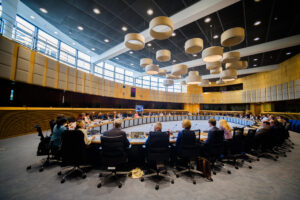
De context: Twin it! 3D for Europe’s culture | Europeana PRO
Het event: High-level event celebrates the achievements of Twin it! 3D for Europe’s Culture | Europeana PRO
-
Sat04May20242:00 pmStadsarchief Amsterdam
A new digital application developed by scholars of the University of Amsterdam brings together wartime diaries of Amsterdam women in an innovative way. The launch of this Amsterdam Diaries Time Machine on May 4 will discuss the importance of diaries as a source for historical research.
For more information and registration, please visit the website of the Amsterdam Humanities Hub.
-
Thu26Oct2023Sat28Oct2023University Library Amsterdam
The University of Amsterdam organizes a conference centered around Urban Lives and Life Writing. There is an exciting lineup of key-note lectures and workshops given by our esteemed colleagues Julie Rak, Nina Siegal, Nadia Bouras and Diederik Oostdijk. Moreover, with over 40 papers the conference will be sure to provide each participant with a panoply of intellectually stimulating new insights on various aspects of life writing and the beautiful city of Amsterdam. More information will follow soon.
Read the call for papers here, to get an idea of the content of the conference.
-
Tue17Oct2023Universiteit Antwerpen
Janna Aerts and Leon van Wissen will present at the Geo Workshop 'Reading Historical Maps in a Digital Era' at the University of Antwerp. The title of their contribution is “developing and extending Amsterdam's location infrastructure for data linking and querying, The Amsterdam Time Machine approach”.
-
Tue26Sep2023Wed27Sep2023Austrian Centre for Digital Humanities and Cultural Heritage, Austrian Academy of Sciences, Vienna
During this conference, our researcher Janna Aerts will present her project “Digital Humanities and Life Writing: A case study of deep mapping Amsterdam diaries and letters”. The conference is centered around the following.
Digital methods, technologies, and formats have increasingly gained traction in the study of life narratives and biographical data, as well as in the presentation of historical lives. Auto/biographical research and practice are aided significantly by biographical research databases and platforms, biographical online dictionaries, digital editions of historical life documents as well as community- and institutionally driven online archives and web-based collaborative Wiki formats, which are characterised by accessibility, searchability, and user-orientedness. In addition, they often encourage interactive participation, and generally open up new quantitative and qualitative pathways / approaches to biographical research.
For more information, click here
You can read the abstract of Janna's presentation here:
for more informationLoading...
-
Wed05Jul2023Sat08Jul2023University of Warsaw
The theme of the IABA Europe Conference 2023 is 'Life-Writing in Times of Crisis' and we be held at the University of Warsaw in Poland. Our researcher Janna Aerts will present her research in a session about Wartime Diaries: "Societal, Personal and Literary Crises in Amsterdam And Brussels’ Occupation Diaries From the Second World War".
Abstract:
Diaries are often considered to be a crisis genre in which people can write about the problems and worries they experience. In times of war and occupation, this aspect gains even more importance: diary writing often becomes an indispensable ritual of reflection, allowing the author to process this large-scale and impactful crisis in their life. Nevertheless, this paper will demonstrate how the authors of occupation diaries during the Second World War do not only reflect on the war crisis, but use the act of diary writing to cope with different types of hardships in their life. These crises can be categorised into three types: societal, personal and literary crises. It will examine three Brussels’ occupation diaries by Dutch-speaking authors (Ernest Claes, August Vermeylen and Jan Walravens) in comparison to one Amsterdam occupation diary (by Toby Vos). By examining the impact of the three types of crises on the occupation diaries, this paper will explore what role diary writing plays in the daily life of the diary authors and how it can serve as a tactic to deal with the different types of crises they experience.Click here for the full programme.
-
Mon26Jun202314:00 - 18:00Startup Village 608 Science Park 1098 XH Amsterdam
Startup Village organizes an event about AI in Cartography, in collaboration with the Allard Pierson Museum and the Amsterdam Time Machine.
Join us on June 26th for an exciting and interactive afternoon (for FREE) dedicated to exploring cutting-edge AI advancements in cartography. Get ready to immerse yourself in a day filled with inspiration, knowledge sharing, and valuable networking opportunities with like-minded individuals who are passionate about the latest AI technologies in cartography.
Program
14:00 – 14:15: Walk-in
14:15 – 14:30: Welcome by Allard Pierson
14:30 – 15:30: Interactive session with Linear Logic. Zeta Alpha, Amsterdam Time Machine
15:30 – 15:45: Short break
15:45 – 16:30: Open Stage - You can join and pitch your AI idea on stage to a relevant audience!
16:30 – 17:15: Wrap-up and summary of the day
17:15 – 18:15: Drinks, bites & networkingClick here to register.
-
Fri02Jun20239:00 amOpenbare Bibliotheek Amsterdam (OBA) Oosterdok
This event is in Dutch.
Het hoofddoel van de City Deal Kennis Maken (CDKM) is om door een betere samenwerking tussen stadsbestuur en kennisinstellingen het oplossen van maatschappelijke opgaven in de steden te versnellen. Dit door onderzoekers, docenten en studenten hier grootschalig bij te betrekken. Inmiddels zijn er 20 steden actief in dit landelijke netwerk. Onze projectmanager Boudewijn Koopmans zal samen met Ahmed Emin Batman een workshop leiden.
In deze workshop vertellen kunstenaar & documentairemaker Ahmed Emin Batman en Boudewijn Koopmans over de samenwerking die ze dit jaar startten. Ahmed werkt aan het vastleggen van pakkende verhalen van Turkse gastarbeiders in de Amsterdamse haven. Boudewijn werkt als projectmanager van de ATM aan het digitaal tot leven brengen van de Amsterdamse geschiedenis. Ze onderzoeken hoe de verhalen van de Turkse gastarbeiders verbonden kunnen worden met informatie uit archieven, andere (museale) collecties zodat deze verhalen hun verdiende plek krijgen in de geschiedenis van de stad.
Je kunt je aanmelden om mee te doen aan de vele inspirerende werksessies via deze website.
-
Wed31May2023Fri02Jun2023Royal Library of Belgium (KBR)
The 10th edition of the Digital Humanities Benelux Conference will take place in Belgium at the Royal Library of Belgium (KBR).The annual DHBENELUX Conference serves as a platform for the community of interdisciplinary Digital Humanities researchers to meet, present and discuss their latest research findings and to demonstrate tools and projects.
Our researcher Janna Aerts, project manager Boudewijn Koopmans and programmer Leon van Wissen will present our pilot project around the Jewish History of Amsterdam on Thursday 1 June. You can read their short paper here:
Loading...
-
Tue18Apr20239:00 amHybrid
Our project manager Boudewijn Koopmans will lead a workshop during the Europeana Conference under the Swedish Presidency of the Council of the EU, 'Accelerating 3D in the common European data space for cultural heritage: Why 3D matters.' The Europeana conference under the Swedish Presidency of the Council of the EU will take place on 18 April 2023 (9h00 - 15h00 CET). The conference will be hosted by the Museum of Ethnography in Stockholm (invite only) and online (open to public). This hybrid event is made possible thanks to the support of the Swedish Ministry of Culture, and is organised in collaboration with the Swedish National Heritage Board. The conference will focus on 3D. We will explore the why and wherefores of 3D in digital cultural heritage: why 3D matters; diversity and variety of content suitable for 3D digitisation; sharing best practices, and much more. We aim to look into aspects, insights and inspirations on 3D as one of the main facets of the common European data space for cultural heritage and the digital transformation of the sector. If you are a digital cultural heritage professional, are interested in the common European data space for cultural heritage, or you work with and around 3D in culture, you would get the opportunity to extend your knowledge and be inspired.
-
Mon17Apr202310:30 amVerkadefabriek Den Bosch
Het Netwerk Digitaal Erfgoed (NDE) organiseert in samenwerking met Erfgoed Brabant een data-doe-dag voor collectiebeherende organisaties. Onze eigen projectmanager Boudewijn Koopmans zal hier ook een presentatie geven. Op de website van het Netwerk Digitaal Erfgoed vind je meer informatie over het evenement en de workshops.
Hoe zorg je ervoor dat je metadata op orde zijn? Hoe maak je informatie over erfgoed voor zoveel mogelijk mensen zichtbaar? Hoe verbind je jouw digitale collectie met andere kennisbronnen? Hoe werk je met het Termennetwerk in jouw systeem? Hoe voorkom je de beruchte 404-melding? Hoe zet je crowdsourcing in? Hoe… Tijdens de Data-Doe-Dag helpen collega’s van erfgoedorganisaties je in praktische werksessies. Neem dus vooral je data en je laptop mee en stel gerust je vragen aan het data-clean-team.Programma
Er zijn 12 verschillende sessies in 3 rondes. Je kunt ter plekke kiezen aan welke 3 workshops je meedoet. Of bezoek het data-clean-team dat de hele dag voor je klaar staat.
10.00 – 10.30 Inloop
10.30: Ontvangst door Patrick Timmermans, directeur Erfgoed Brabant
10.45 – 12.00 Doe-ronde 1: keuze uit 3 workshops en data-clean-team
12.00 – 13.15 Lunch
13.15 – 14.30 Doe-ronde 2: keuze uit 3 workshops en data-clean-team
14.45 – 16.00 Doe-ronde 3: keuze uit 3 workshops en data-clean-team
16.00 – 16.30 Plenaire afsluiting
16.30 – 18.00 BorrelMeld je aan!
Deelname aan deze dag is gratis, maar schrijf je wel even van tevoren in. Mocht je toch niet kunnen of andere vragen hebben, laat het weten via info@netwerkdigitaalerfgoed.nl.
-
Thu23Mar202315:00 - 17:00Chocoladefabriek, Gouda
Geïnspireerd door de Venice Time Machine wordt in Nederland op verschillende plaatsen gewerkt aan lokale en regionale Time Machines, aangesloten bij de Europese Time Machine Organization. Onderzoekers, geschiedenisliefhebbers en programmeurs werken aan het digitaliseren van bronnen en het visualiseren van vele eeuwen geschiedenis. Veel werk wordt daarbij verzet in de eigen omgeving. Wij hebben echter de overtuiging dat kennisuitwisseling en samenwerking kan bijgedragen aan het succes van de initiatieven in Nederland.
Tijdens de landelijke bijeenkomst op 23 maart openen we plenair met een update van vier tijdmachines in Nederland. Daarna gaan we aan de slag met de thema’s kennisdeling en het aangaan van partnerships. We sluiten af met het maken van vervolgafspraken en praten graag door tijdens de borrel.
-
Wed19Oct202215:00 - 17:00 CESTe-Lab (0.16), BG1, Media Studies, UvA
Event description
In this Salon, organized jointly by the Amsterdam Time Machine (ATM) and CREATE, we discuss how historical knowledge about the management of urban challenges in the past is a potential source of inspiration to design sustainable solutions for the future.
We do so with Boudewijn Koopmans from the Amsterdam Time Machine, Indira van ‘t Klooster from Arcam (Architecture Center Amsterdam), Wietse Balster from 3DAmsterdam, and Clemens Beck from the Friedrich Schiller University (FSU) of Jena. These partners have collaborated at the pilot project ‘Living with water in Amsterdam’, which aims to collect, analyze, and visualize historical data on water in the city. The project has materialised in an exhibition at Arcam showcasing interactive installations of the past, present, and future of Amsterdam’s relation with water in the Kattenburg area. The FSU Jena has made available a semi-automated pipeline and a prototype VR application to visualize historical image-based reconstructions of disappeared buildings.
Recording
https://youtu.be/yoxK3C-8vkI
Programme
15:00 Welcome and introduction by Julia Noordegraaf
15:10 Boudewijn Koopmans, Amsterdam Time Machine: How knowledge of the past helps us deal with the future
15:20 Indira van ‘t Klooster, The exhibit 'Fluid matter' at Arcam
15:45 Wietse Balster, 3D Amsterdam as vehicle to time travel
16:10 Clemens Beck, Jena4D - Shaping a virtual city chronicle
16:30 Discussion
17:00 Drinks at Kapitein ZepposSpeakers
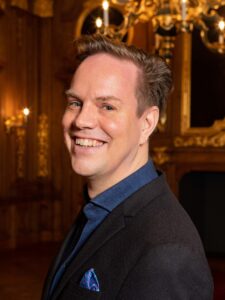 Boudewijn Koopmans has been project manager of the ATM since mid-2022. As a project manager, Koopmans is involved in forging partnerships in the field of research, the technical infrastructure of the ATM, and multimedia applications. He will be working on the generation of additional funding that will help bringing the Time Machine’s dream closer. Koopmans was educated at the Amsterdam Academy of Banking and Finance and in 2014 he obtained a Master's degree in Art and Culture Studies at the Open University. His career started in telecom & multimedia and in 2008 he moved to the museum sector, where he worked successively at the Cobra Museum, the Royal Picture Gallery Mauritshuis and the National Maritime Museum, responsible for fundraising, relationship management and collaboration with business communities and social organisations.
Boudewijn Koopmans has been project manager of the ATM since mid-2022. As a project manager, Koopmans is involved in forging partnerships in the field of research, the technical infrastructure of the ATM, and multimedia applications. He will be working on the generation of additional funding that will help bringing the Time Machine’s dream closer. Koopmans was educated at the Amsterdam Academy of Banking and Finance and in 2014 he obtained a Master's degree in Art and Culture Studies at the Open University. His career started in telecom & multimedia and in 2008 he moved to the museum sector, where he worked successively at the Cobra Museum, the Royal Picture Gallery Mauritshuis and the National Maritime Museum, responsible for fundraising, relationship management and collaboration with business communities and social organisations.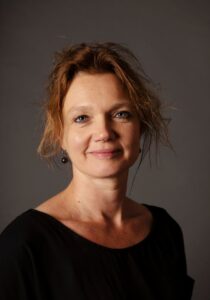 Indira van ‘t Klooster is the director of the Amsterdam Architecture Center (Arcam), where she has been exploring with many parties how a city model with digital layers can be a tool in the use of data for the big design questions for the future. At Pakhuis de Zwijger she presents various events on current themes in architecture. Previously, she was the editor-in-chief of A10 new European architecture magazine and cooperative, as well as senior advisor on architectural policies for politicians, clients and architects at Architectuur Lokaal. She graduated as architectural historian at the University of Amsterdam in 1996.
Indira van ‘t Klooster is the director of the Amsterdam Architecture Center (Arcam), where she has been exploring with many parties how a city model with digital layers can be a tool in the use of data for the big design questions for the future. At Pakhuis de Zwijger she presents various events on current themes in architecture. Previously, she was the editor-in-chief of A10 new European architecture magazine and cooperative, as well as senior advisor on architectural policies for politicians, clients and architects at Architectuur Lokaal. She graduated as architectural historian at the University of Amsterdam in 1996.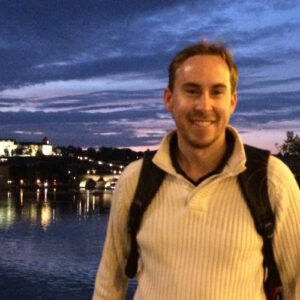 Wietse Balster has been working for the City of Amsterdam since 2008 and has a background in geo-information/GIS and Spatial Planning. As Product Owner, he has been leading the development of 3D Amsterdam since 2019: a project in which the entire city is recreated in a Virtual 3D environment to be used for a wide range of applications. One is time travel.
Wietse Balster has been working for the City of Amsterdam since 2008 and has a background in geo-information/GIS and Spatial Planning. As Product Owner, he has been leading the development of 3D Amsterdam since 2019: a project in which the entire city is recreated in a Virtual 3D environment to be used for a wide range of applications. One is time travel.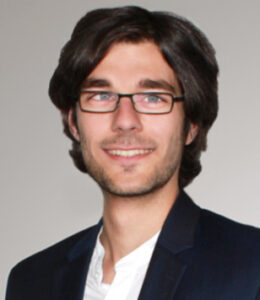 Clemens Beck is a Research Associate at the Junior Professorship Digital Humanities at the Friedrich-Schiller-University Jena (FSU) where he coordinates the two research projects 'DFG 3D-Viewer' and 'Jena 4D'. Between 2020 and 2022, he was Research Associate at the Institute of Computer Science at FSU, working on the research project 'CORE-H: a digital research environment for the humanities. Requirements analysis and first prototypical realization using the example of research on southwestern and central German humanism'. Prior to that, he was Research assistant at the Goethe and Schiller Archive of the Klassik-Stiftung Weimar and lecturer at the Ludwig-Maximilians-University Munich, University of Erfurt, and at FSU. He has a background in History and Economics (BA) and in in interdisciplinary medieval studies (MA) and holds a PhD from the Ludwig-Maximilians-University Munich, with a PhD scholarship from the Hans Böckler Foundation and the German Academic Scholarship Foundation.
Clemens Beck is a Research Associate at the Junior Professorship Digital Humanities at the Friedrich-Schiller-University Jena (FSU) where he coordinates the two research projects 'DFG 3D-Viewer' and 'Jena 4D'. Between 2020 and 2022, he was Research Associate at the Institute of Computer Science at FSU, working on the research project 'CORE-H: a digital research environment for the humanities. Requirements analysis and first prototypical realization using the example of research on southwestern and central German humanism'. Prior to that, he was Research assistant at the Goethe and Schiller Archive of the Klassik-Stiftung Weimar and lecturer at the Ludwig-Maximilians-University Munich, University of Erfurt, and at FSU. He has a background in History and Economics (BA) and in in interdisciplinary medieval studies (MA) and holds a PhD from the Ludwig-Maximilians-University Munich, with a PhD scholarship from the Hans Böckler Foundation and the German Academic Scholarship Foundation. Physical Location:
E-Lab (0.16), BG1, Media Studies, UvA
Turfdraagsterpad 9
1012XT Amsterdam
Virtual Location: Zoom link
-
Mon10Oct202211:30 - 12:30Livestream
Julia Noordegraaf, Vice President of Time Machine Organization and leading the Amsterdam Time Machine initiative, has been invited as a speaker at the Bloomberg CityLab 2022 in Amsterdam.
Bloomberg CityLab, the preeminent global cities summit organized by Bloomberg Philanthropies in partnership with the Aspen Institute, will take place in Amsterdam from October 9 to October 11, 2022. Cities are on the frontlines of today’s major crises – from leading their communities through pandemic recovery to welcoming refugees from global conflicts to combating climate change – and Bloomberg CityLab 2022 will bring together mayors from around the world alongside prominent city innovators, business leaders, urban experts, artists, and activists to discuss and discover replicable solutions to these pressing issues.
In this context, Julia Noordegraaf will illustrate, in an interview with David Dudley, how Time Machine processes historical documents with the help of AI to unlock the ‘Big Data’ of Europe’s Past, and how the latter can contribute to addressing present-day challenges in urban management, design, and development.
The interview will take place on October 10, 2022, from 11:30 am to 12:30 pm.
You can watch the livestream here: https://citylab.bloomberg.org/
-
Thu01Sep202213:00 – 17:00 CESTe-Lab (0.16), BG1, Media Studies, UvA
Omschrijving
Een van de doelen van de Amsterdam Time Machine is om het digitale schetsmodel van historisch Amsterdam tot leven te brengen door deze te vullen met 3D-reconstructies van gebouwen door de tijd heen. Inmiddels zijn er al een aantal 3D-modellen voor verschillende gebouwen en tijden ontwikkeld door onderzoekers, erfgoedprofessionals en/of burgers met een passie voor Amsterdam en haar rijke historie. Om het mogelijk te maken om alle bestaande en toekomstige 3D-modellen in de Time Machine te integreren, is het essentieel dat er een duidelijke workflow wordt ontwikkeld, van de creatie van het model tot de publicatie ervan.
Tijdens deze datasprint (in samenwerking met het 4D Research Lab) zullen onderzoekers met ervaring in 3D-modellering van historisch Amsterdam hun methoden en ervaringen delen in het omgaan met zaken als het gebruiken en citeren van historische bronnen; hoe om te gaan met onzekerheden bij reconstructies; en hoe u modellen publiceert met degelijke begeleidende documentatie. Deelnemers worden ook uitgenodigd om hun eigen input en data mee te nemen om ter plaatse aan 3D-modellen te werken.
Programma, 13:00 - 17:00
- Inleiding en doelen van de data sprint | Julia Noordegraaf (5’)
- Omgaan met onzekerheid in historische 3D-reconstructies | Chiara Piccoli, project Virtual Interiors (10’)
- Documentatie, archivering en publicatiepraktijken | Jitte Waagen, Tijm Lanjouw, 4D Research Lab (10')
- 17e-eeuws Amsterdam VR demo | Tom van Maanen (5’)
- Discussie (20')
- Introductie werksessie: demo over het uploaden van 3D-modellen in Zenodo | Daan Groot (10’)
- Werksessie | Begeleiding: Ivan Kisjes, Daan Groot (2u30’ met pauze)
- Afronding: resultaten en vragen uit de werksessie delen; gezamenlijk ontwerp van de workflow voor publicatie op de ATM-website (30’)
17:00: Borrel bij Kapitein Zeppos
Locatie: e-Lab (0.16), BG1, Media Studies, UvA, Turfdraagsterpad 9, 1012XT Amsterdam
Taal: NederlandsNederlands
-
Thu04Mar202115:00 - 17:00Online
On March 4th, 2021 the Amsterdam Time Machine hosted the ‘Dutch Time Machines workshop’: an online event to share updates from, and foster exchanges among Local Time Machines (LTMs) in the Netherlands. LTM projects are one of the main pillars of Time Machine’s ambition to develop the Big Data of the Past: a huge distributed digital information system mapping the European social, cultural and geographical evolution across times.
The workshop included presentations from projects in Amsterdam (Amsterdam Monumentenstad; Waterlooplein 3D; Virtual Interiors), Leiden (Canals5D Leiden), Utrecht (Living Pasts, Utrecht Time Machine), Limburg (Aezel, Limburg Time Machine), and Breda (Virtueel Princenhage).
The event was chaired by Julia Noordegraaf, moderated by Melvin Wevers, and organized by Ilaria Manzini (Amsterdam Time Machine | University of Amsterdam).
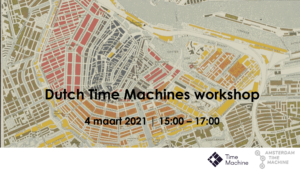
-
Thu12Mar202011:00 am - 4:00 pmE-lab Room 0.16 (Turfdraagsterpad 9, 1012XT, Amsterdam)
On Thursday 12t March the Amsterdam Time Machine / Golden Agents will organize a datasprint around the datasets ECARTICO and ONSTAGE. These data sets have been developed at the University of Amsterdam and made available as Linked Open Data as part of the Golden Agents program.
For those unfamiliar with these data sets: ECARTICO contains biographical data about painters, engravers, publishers, goldsmiths, writers and other creative people working in the Low Countries in the sixteenth and seventeenth centuries and about the people in their networks. The dataset now contains data on more than 50,000 persons. ONSTAGE contains the complete performance history in the Amsterdamse Schouwburg from 1638 to 1940 (and soon: until the present).
Both ONSTAGE and ECARTICO provide extensive links to Wikidata (a database connected to Wikipedia), the DBNL (Digital library of Dutch literature), the RKD (Dutch Institute for Art History) and other resources. The idea behind Linked Open Data is that you can connect different data sets over the Web. During this datasprint we will show how this can be done. Afterwards we will investigate in smaller workshops what the added value is for historical research. For this purpose we have four workshops in mind:
Workshop 1: ONSTAGE, ECARTICO and the Panpoeticon Batavûm.
The Panpoeticon Batavûm is a collection of small portraits of Dutch poets (and writers in general). The collection was set up at the beginning of the eighteenth century by the painter Arnoud Halen (1673-1732). As a collection the Panpoeticon is no longer intact, but fortunately researchers at Radboud University have made a beautiful digital reconstruction (www.schrijverskabinet.nl). By connecting this digital Panpoeticon to the datasets mentioned above, we can start asking questions such as ‘To what extent were the authors of popular pieces in the Amsterdam Theatre included in the Panpoeticon?’ and ‘What was the geographical distribution of the poets included in the Panpoeticon?Workshop 2: ECARTICO, Wikidata and Wikipedia.
ECARTICO provides extensive links to Wikidata. In this workshop we want to investigate the added value of these links and whether we can increase the mutual interlinkage of the datasets. Because Wikidata also serves as an international portal to Wikipedia, We can for instance think of using features of Wikipedia entries (e.g. word counts, number of images, number of language editions) as proxy values for analyzing geographical biases and canonization effects or simply as a proxy for the 21st century esteem of persons and objects under consideration.Workshop 3: Geographies and networks of style and subject matter.
Links to the RKD and Wikidata enable us to harvest large amounts of data (including images) on works of art. In theory this provides us with an opportunity to create huge geographies and social networks of style and subject matter. In this workshop we will explore the practical feasibility of such an operation and discuss its theoretical and methodological implications.Workshop 4: Enhanced publications
In this workshop we will explore the potantial of Linked Data to create enhanced publications. As a use case we will take the ‘Groote schouburgh der Nederlantsche konstschilders en schilderessen’ by Arnold Houbraken. This book provides an overview of Netherlandish painters of the sixteenth and seventeenth century. It was originally published in 1718/1721 and is now digitally available at the DBNL. However, the biographies provided by Houbraken are not illustrated and are often erroneous since Houbraken had a greater fondness for anecdote than for accuracy.(Drinks afterwards)
-
Wed11Dec201910-17UvA eLab Mediastudies
On Wednesday 11 December (10-17, eLab Mediastudies UvA) we are organising a datasprint on ATM person data. Now that we’re making progress with the geo-infrastructure, we’re developing an approach to collectively identify and analyse Amsterdam people from a long-term perspective. Ivan and Leon have started a shared sheet that helps us see where we are now and what we need to do get to comprehensive person-time-location data, also based on work already done by Richard, Ivo and other colleagues. More information can be found in a google doc that can be shared upon request. For the datasprint we’ll be developing several concrete tasks that we’ll also share in this document. Please sign up by sending an email through the contact form on this website if you’d like to come.
-
Thu10Oct2019Fri11Oct2019Dresden, Germany
The Time Machine Conference 2019 will take place on October 10-11, 2019 at Deutsches Hygiene-Museum Dresden in Dresden, Germany, and of course ATM will also be there.
Register here to hear speakers from Europe’s most prestigious science, technology and cultural institutions discuss the potential of cultural heritage data for education, creative and media industries, entertainment, urban planning, policymaking and more.
-
Wed25Sep201911.00-17.00UvA eLab Mediastudies
The aim of the fifth Amsterdam Time Machine datasprint is to add or enrich information on the history of Amsterdam in Wikidata. This will, for instance, help us to expand https://years.amsterdamtimemachine.nl/ as developed by Menno, Marieke and Leon during a previous datasprint. We’ll be preparing some data on our end, but you’re also welcome to share your own resources and ideas.
Please sign up through the contact form on this website if you’d like to join us and we’ll provide you with further information.
-
Thu29Aug2019Sat31Aug2019Rotterdam
Our panel on local entertainment cultures has been accepted for the 2019 conference of the European Business History Association. Together with colleagues from the University of Antwerp (check out their local time machine here), we'll be exploring theatre, cinema, nightlife and magic lanterns.
-
Wed26Jun2019Fri28Jun2019Nassau, The Bahamas
Researchers Vincent Baptist presents the cinema history part of the ATM-CLARIAH project at the 2019 HoMER conference. His paper is entitled Amsterdam Cinema Audiences: A Geospatial Analysis of Film Exhibition and Consumption in Early 20th Century Amsterdam.
-
Sat15Jun2019
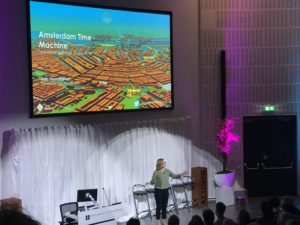
Julia Noordegraaf was invited to give the keynote lecture at the UvA Universiteitsdag, where alumni and UvA researchers meet annually. Here, she speaks about the Amsterdam Time Machine.
https://alumni.uva.nl/alumniservices/ud/universiteitsdag.html
-
Wed12Jun2019Austrian Academy of Sciences
Marieke van Erp will present the Amsterdam Time Machine at the Austrian Academy of Sciences, in the lecture series of the Austrian Centre of Digital Humanities.
-
Tue11Jun20199.30-17.00Turfdraagsterpad 9 (BG1), room 0.16 (e-Lab)
Together with Stadsarchief Amsterdam, we organize the fourth Amsterdam Time Machine datasprint. This data sprint will be about computer-transcribed notarial deeds. More information will follow shortly, but here you can information on the source of the data we'll be playing around with: the Crowd Leert Computer Lezen project.
-
Thu09May2019Fri10May2019University of Amsterdam
Following our kick-off meeting in Brussels last month, there will be a second Time Machine-wide event in Amsterdam from Thursday May 9 (09:30-18:00) to Friday May 10 (9:30-16:00). It will take place at the University of Amsterdam, specifically venues at Oudemanhuispoort (https://www.uva.nl/locaties/binnenstad/bg-1.html) and Turfdraagsterpad 9 (BG1) (https://www.uva.nl/locaties/binnenstad/oudemanhuispoort.html).
-
Thu09May20198:00 pmSpui25
More info on the venue and event series:
Time machines have been the stuff of stories and speculations for centuries. Today, advancements in computation allow us to construct such machines as complex information systems that process cultural heritage as big data of the past. In this event, researchers of the new Time Machine project present their exciting initiative.
The Time Machine project is a large-scale research initiative designed to map over 5000 years of European history, transforming kilometres of archives and large collections from museums into a digital information system. Over 281 institutions from 33 European countries are joining forces to bring the past back in one of the most ambitious projects aimed to consolidate European culture and identity. This event is an opportunity to engage with these researchers and hear from their ideas as to what the European Time Machine is and does, as well as to how it responds to the societal challenges of several European cities. Frédéric Kaplan, Julia Noordegraaf and Andreas Maier each present different facets of the project, while Claartje Rasterhoff moderates a panel discussion with Valérie Gouet-Brunet, Harry Verwayen, Bastien Varoutsikos and Deborah Papiernik on applications of the Time Machine for environmental security, the preservation of endangered heritage and the creative industries.
About the speakers
Julia Noordegraaf is professor of Digital Heritage in the department of Media Studies at the University of Amsterdam. She is director of the Amsterdam Centre for Cultural Heritage and Identity (ACHI), one of the university’s research priority areas. At ACHI she leads the digital humanities research program Creative Amsterdam (CREATE), that studies the history of urban creativity using digital data and methods. Noordegraaf’s research focuses on the preservation and reuse of audiovisual and digital heritage.
Frédéric Kaplan holds the Digital Humanities Chair at École Polytechnique Fédérale de Lausanne (EPFL) and directs the EPFL Digital Humanities Laboratory (DHLAB). He conducts research projects combining archive digitization, information modeling and museographic design. He is currently directing the “Venice Time Machine”, an international project aiming to model the evolution and history of Venice over a 1000 year period. In parallel to his scientific work, Frederic Kaplan participated to exhibitions in several museums including the Biennale of architecture in Venice, the Grand Palais and the Centre Pompidou in Paris and the Museum of Modern Art in New York.
Andreas Maier is a computer scientist and specialist in topics of pattern recognition and machine learning. He heads the pattern recognition lab at the Friedrich-Alexander-Universität working on topics in medical imaging, speech processing, computer vision, and general machine learning. His work focuses on tomography of books and scrolls (i.e. reading them without opening them), scribe and writer identification, and the fusion of deep learning with traditional techniques, such as general signal processing or knowledge representation.
Claartje Rasterhoff is Assistant Professor of Urban History and Digital Methods at the department of History, University of Amsterdam. She acts as coordinator of the Amsterdam Time Machine project. Her research concerns the relationship between culture, economy, and cities since the sixteenth century. She is currently developing a digital historical project on the cultural economy of urban nightlife. She has published on the painting and publishing industries in the early modern Dutch Republic, the organization of the early modern international art trade, and the history of Dutch Design.
Registration
You can sign up for this program for free. If you subscribe for the program we count on your presence. If you are unable to attend, please let us know via spui25@uva.nl | T: +31 (0)20 525 8142.
-
Thu18Apr2019nnbUvA eLab Mediastudies
For this data sprint, we propose building an experimental interface to combine 2D, 3D and textual data in one map of Amsterdam. We will be using libraries that contain such data and testing their application in a map, as well as paying attention to existing gaps in the datasets. The result should be a demo interface that provides intuitive access to the data without being overwhelming. Interface experts and designers are especially desired, so if you know any, please do feel free to forward this event to them.
If you’d like to join, please let us know by contacting us through the contact form on this website and we will send you other relevant information in the coming weeks.
-
Fri29Mar2019Stadsarchief
Claartje Rasterhoff will present the Amsterdam Time Machine at the symposium 'Ja ik wil' (Yes, I do). At this symposium René van Weeren and Tine de Moor (Utrecht University) will launch their new book Ja ik wil, verliefd, verloofd, getrouwd in Amsterdam, 1580-1810. There is a morning program on the topic of citizen science and an afternoon program with research on historical marriage patterns and other relevant projects ( in Dutch).
-
Mon18Mar2019Wed20Mar2019Brussel
The official Time Machine Kick-Off takes place in Brussels on the 19th and 20th of March. ATM members Julia Noordegraaf and Claartje Rasterhoff (UvA), Harry Verwayen (Europeana), Marc Lindeman and Ellen van Noort (Picturae), Walter Swagemaker (Eye Filmmuseum), Johan Oomen (Institute for Sound and Vision) and many others will be attending.
-
Tue05Mar2019Wed06Mar2019De Doelen, Rotterdam
Claartje Rasterhoff, one of ATM's coordinators, will present ATM at the annual DEN event. You can find the entire program here.
-
Thu28Feb201909:30 - 16:00 Spinhuis 2.18, Oudezijds Voorburgwal 185 Amsterdam
The Amsterdam Time Machine organizes a mini data sprint on the subject of data storage structure. This event has sprouted from the need to design a logical structure for storing the CLARIAH Amsterdam Time Machine project data. The team members will focus on devising a solution for storing their research data.
The data sprint (09:30 - 16:00) will take place in room is 2.18 at Spinhuis, Oudezijds Voorburgwal 185 Amsterdam. People will need to sign in at the reception, and state that they come visit Marieke van Erp or Astrid Kulsdom.
Please sign up through the contact form.
-
Thu31Jan2019Doelenzaal, Universiteitsbibliotheek UvA Singel
Please be invited to the kick-off meeting organized by the Virtual Interiors as Interfaces for Big Historical Data Research project. Join if you are interested to learn more about this NWO Smart Culture – Big Data / Digital Humanities funded project on spatially enhanced publications of the creative industries of the Dutch Golden Age, which is hosted at Huygens ING and CREATE (UvA) and works in close collaboration with Brill and the Netherlands Institute for Sound and Vision.
The program can be found here.
-
Thu22Nov201815:00 - 17:00Doelenzaal, Universiteitsbibliotheek UvA Singel
The upcoming CREATE Salon takes place on Thursday 22 November between 3:00-5:00pm, UBA Doelenzaal, Singel 425 Amsterdam. This month’s topic is the Amsterdam Time Machine. During the salon, invited speakers will introduce their projects and and we will discuss three pilot projects within the larger CLARIAH project on the Amsterdam Time Machine: linguistics, social and economic history and media studies
I. Linguistics: a reconstruction of nineteenth-century Amsterdam dialects and sociolects, Marieke van Erp (KNAW Humanities Cluster) and Nicoline van der Sijs (Meertens Instituut)
According to some linguists there was a whopping number of 19 neighbourhood dialects in Amsterdam, next to three sociolects: the languages of the low, high, and middle classes. Is it possible to reconstruct these dialects and sociolects based on preserved historical information? And were there indeed so many different ‘accents’?II. Social and Economic History: Amsterdam Elite, Richard Zijdeman (IISG) and Ivo Zandhuis (AdamNet)
In this project we transform the original dataset (1986) by Boudien de Vries on Amsterdam Elite 1850-1895 into Linked Open Data. This process links additional, social-demographic data that has been developed since and enables new analysis and visualization.III. Media Studies: Amsterdam Cinema Audiences, Julia Noordegraaf (CREATE) and Vincent Baptist (CREATE)
The consumption of film as a new medium by historical audiences has traditionally been hard to grasp, since sources were sparse, distributed and difficult to analyse in combination. The Media Studies use case aims to develop a better understanding of the historical audiences of Amsterdam cinema theatres in the early 20th century by combining data on cinema theatres and programming from the online Cinema Context database with contextual data on the socio-economic composition of cinema neighborhoods in a geospatial analysis based on the georeferenced and vectorized maps made available in the CLARIAH Amsterdam Time Machine project.
